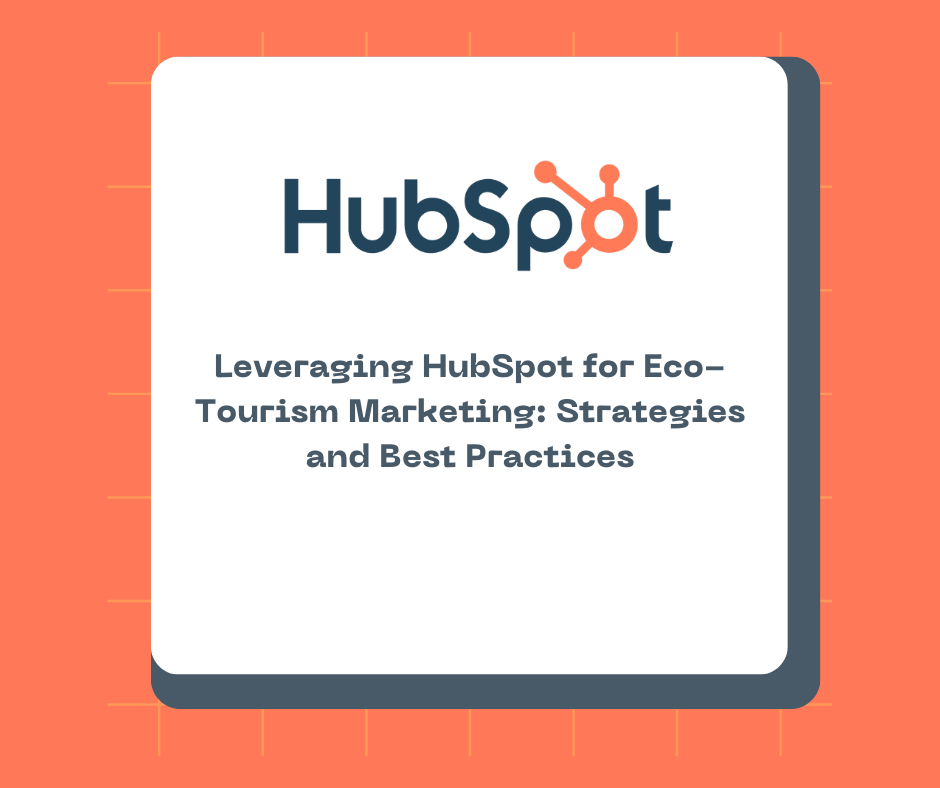Eco-tourism has emerged as a thriving niche within the broader travel industry, appealing to those who seek to explore the world responsibly and sustainably. Marketing eco-tourism effectively requires a unique approach that highlights environmental conservation, supports local communities, and provides authentic and transformative travel experiences. HubSpot, with its comprehensive suite of marketing tools, offers eco-tourism businesses a robust platform to reach and engage their target audience effectively. This article explores how eco-tourism businesses can leverage HubSpot to enhance their marketing efforts, ensuring they attract conscientious travelers while promoting sustainability.
Understanding the Eco-Tourism Market
Eco-tourism is not just about traveling to natural areas; it encompasses a broader commitment to environmental stewardship and cultural sensitivity. Eco-tourists typically look for experiences that are educative, ethically sound, and contribute to conservation efforts. The challenge for eco-tourism marketers is to communicate the unique attributes of their offerings and differentiate themselves in a market that is often crowded with claims of sustainability and conservation.
Challenges in Eco-Tourism Marketing
- Authenticity in Marketing: Conveying genuine sustainability and ethical practices in a way that resonates with potential tourists.
- Differentiation: Standing out in a niche that has become increasingly popular and competitive.
- Community Engagement: Effectively involving local communities and showcasing their involvement as a key part of the eco-tourism experience.
- Digital Presence: Maintaining a strong online presence that appeals to the eco-conscious traveler.
Leveraging HubSpot for Effective Eco-Tourism Marketing
1. Utilizing HubSpot’s CRM for Personalized Marketing
Understanding your audience is crucial in eco-tourism, where travelers’ preferences can vary significantly. HubSpot’s CRM allows businesses to gather and analyze customer data effectively. This data can be used to create detailed buyer personas—semi-fictional representations of your ideal customers based on real data about customer demographics, behavior patterns, motivations, and goals. These personas can help tailor your marketing messages to match the specific interests, such as wildlife conservation or community-based tourism, ensuring that the content is relevant and engaging.
2. Content Marketing Through HubSpot’s CMS
Content is a powerful tool in eco-tourism marketing, used to educate potential tourists about sustainable practices and the specific efforts of your tours or accommodations in promoting environmental stewardship. HubSpot’s Content Management System (CMS) allows businesses to create, manage, and track the performance of their content. Blog posts, infographics, and videos about local conservation efforts, biodiversity, and community stories can attract and engage potential travelers. Utilizing SEO tools provided by HubSpot, this content can be optimized to increase visibility on search engines, attracting organic traffic to your website.
3. Email Marketing to Foster Relationships
Email marketing remains one of the most effective channels for maintaining relationships with past and potential travelers. HubSpot’s email tools enable businesses to send targeted, personalized email campaigns that keep subscribers engaged with updates, news, and special offers. For eco-tourism, emails can be used to share success stories of conservation, tips for sustainable travel, or invitations to special eco-friendly events, helping to build a community of like-minded individuals.
4. Social Media Integration
Social media is a crucial platform for visual storytelling, which is incredibly effective in the travel industry. HubSpot’s social media tools help manage and schedule posts, interact with followers, and measure the impact of different types of content. Sharing beautiful images of destinations, videos of wildlife, and stories from local communities can inspire followers and encourage them to book their next eco-friendly adventure. Hashtags and social media campaigns promoting sustainability can also widen your reach.
5. Automating Marketing Workflows
Automation is key to maintaining consistent communication with potential and returning tourists without demanding significant manual effort. HubSpot allows the creation of automated workflows for sending out welcome emails, post-trip follow-ups, and regular newsletters. These automated messages can be personalized based on the interactions the customer has had with your content, ensuring relevant and timely communication.
6. Analyzing Campaign Performance
To continuously improve marketing strategies, it’s crucial to analyze the performance of all campaigns. HubSpot provides detailed analytics that can help eco-tourism marketers understand what is working and what isn’t. Metrics such as page views, click-through rates, conversion rates, and social media engagement provide valuable insights that can inform future marketing efforts.
Best Practices for Eco-Tourism Marketing with HubSpot
- Highlight Authenticity: Always communicate transparently about your sustainability efforts and how your operations contribute positively to the environment and local communities.
- Engage Locally: Use your platform to highlight and support local cultures, crafts, and conservation efforts. Showcasing these aspects can enrich the marketing content and offer a more compelling reason for tourists to choose your business.
- Optimize for Mobile: Ensure that all online content, especially your website and emails, is mobile-optimized. Many travelers use mobile devices to research and book their travels.
- Encourage Reviews and Feedback: Use HubSpot to automate the process of asking for feedback and reviews after a trip. Positive reviews can be very influential for potential customers making booking decisions.
Conclusion
By integrating HubSpot into their marketing strategies, eco-tourism businesses can more effectively reach and engage their target audience. HubSpot’s CRM, combined with its powerful content management, social media integration, and automation tools, offers eco-tourism marketers the ability to create personalized, informative, and compelling marketing campaigns. These efforts not only drive bookings but also promote sustainable tourism practices, helping to ensure that eco-tourism continues to contribute positively to both the environment and local communities.
Schedule your training session here and comment “Need Training” on the request form.

Comments